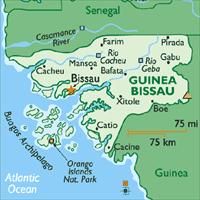GUINEA-BISSAU: Uncertain future as President dissolves government

President Joao Bernardo Vieira announced he had dissolved parliament on 5 August replacing Prime Minister Martinho Ndafa Cabi of the African Party for the Independence of Guinea Bissau and Cape Verde (PAIGC) with Prime Minister, Carlos Correia.
Correia, an agricultural engineer who was trained in Germany, has already served as prime minister under President Vieira from 1991 to 1994, and again from 1997 to 1998. He will be the country’s 12th prime minister since 1980 - Martinho Ndafa Cabi’s government lasted just 15 months.
A new government will be nominated in the coming days to lead the country up to 16 November legislative elections. Under the presidential decree, only the standing committee of the national assembly will continue to function.
Aims
Vieira said his aim was to bring to an end a political crisis which has struck Guinea-Bissau since 26 July when the PAIGC withdrew from the coalition government following the sacking by Prime Minister Marthinho Ndafa Cabi of four high-ranking officials without first consulting the coalition.
However Joao Seco Mané, leader of the Social-Democratic Party (PSD) said people are “scared” of the possible consequences of the current situation “because they know Guinea-Bissau has gone through many bloody events in its recent history”. For Mané, it is vital that the president’s actions do not favour one political party over another, for this could cause more instability in the future.
Guinea-Bissau has suffered a series of coups and uprisings since it attained independence in 1974.
Malam Sanha, a journalist, agreed. "The situation could get worse at any moment, particularly on the part of the Social Renovation Party (PRS) which has an armed wing and a militia [if they take action]. People are really worried about what might happen next,” he said.
Expectations
Shola Omoregie, head of the UN’s peacebuilding office in Guinea Bissau (UNOGBIS) told IRIN, “We will make it clear what we expect from the new government and leaders of Guinea-Bissau – namely, that stability in the country must be upheld, and that elections be held in November.”
The parliamentary peace council of the West African Economic and Monetary Union (UEMOA) announced in a statement on 5 August it is holding crisis meetings with political actors to try to bring about a resolution to the crisis.
Not everyone is worried however. University student Constantino Batista told IRIN, “I agree with the dissolving of parliament and the fall of Cabi’s government. Cabi’s government has been noted for its incompetence over the past 15 months - with this new government we have a hope that things will improve.”
 Back and Next - Back and Next
Back and Next - Back and Next See Also - See Also
See Also - See Also